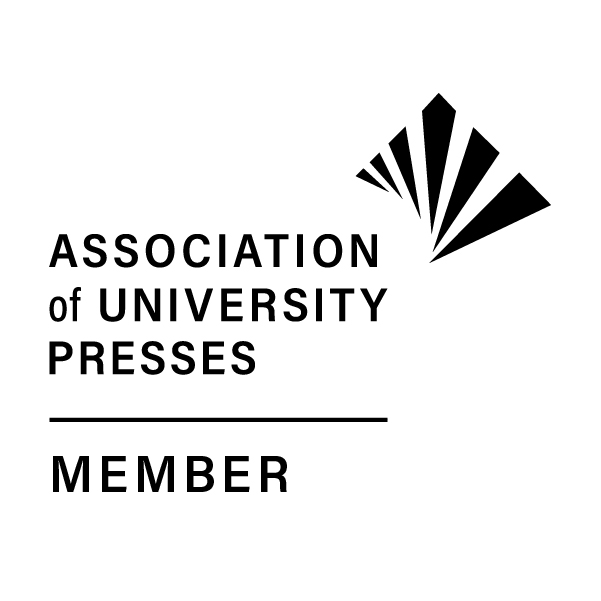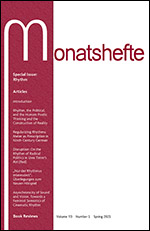|


|

Subscribe
Read the Journal Online
Submission Guidelines
Editorial Board
Receive Email Updates
Advertise in Monatshefte
Indexes/Abstracts
Current Issue TOC
Back Issues TOC
Monatshefte 2022 Subscription Rates
Institutions:
print & online $271
online only $233
Individuals:
print & online $103
online only $86
Non U.S. Postage (no postage charges for online-only subscriptions)
Airmail: add $40/yr.
Canadian Subscribers: add 5% GST. |
Monatshefte
Volume 89, Number 4, Winter 1997 Table of Contents
Special Issue
Libuše Moníková / Herta Müller—Sprache, Ort, Heimat
Sabine Gross
Einleitung: Sprache, Ort, Heimat
Interviews
Libuše Moníková / Helga G. Braunbeck
Gespräche mit Libuše Moníková
The Czech-born author talks to Helga Braunbeck about her identity as a writer and the dynamics of writing; the interview offers insight into her poetics while giving an introductory overview of her work. (SG) (In German)
Herta Müller / Wolfgang Müller
“Poesie ist ja nichts Angenehmes”: Gespräch mit Hert Müller
In this interview conducted at Dickinson College in the summer of 1996, the Romanian-German author of Niederungen and numerous other works discusses her biography, politics, literary language, and ethics. (SG) (In German)
Articles
Ulrike Vedder
“Mit schiefem Mund auch ‘Heimat’”—Heimat und Nation in Libuše Moníkovás Texten
Abstract:
The concepts of ‘homeland’ and ‘nation,’ historically loaded terms in the German context, acquire a specific inflection in Libuše Moníkovás texts: national images and myths are confronted with the individual search for an origin, which--intensified through exile respectively ex-patriation—proves unreachable. This confrontation—central issue in Pavine für eine verstorbene Infantin (1983), Treibeis (1992), and Verklärte Nacht (1996)—shatters the customary ontologization of homeland and nation not only in terms of content but also through Moníková’s de-symbolizing and de-centralizing style. Drawing on the concept of ‘landscape’ as developed by Walter Benjamin and Moníková, the article depicts a concept of ‘homeland’ which is not constituted from the rejection of everything foreign and the forgetting of all contradictions, but rather from memory, from the deciphering of ambivalence, and from a special relationship of time and space. (UV) (In German)
Helga G. Braunbeck
The Body of the Nation: The Texts of Libuše Moníková
Abstract:
This investigation of the concept of ‘nation’ in the novels and political essays of German author and Prague exile Libuše Moníková draws on theories of the nation (Anderson, Bhabha, Kristeva) and of postmodern poetics (Hutcheon). Moníková’s textual construction of ‘nation’ are examined as they intersect with gender. This article traces how Moníková’s exploration of the body of the nation moves from allegory of female victimhood in Die Schädigung (1981) and Pavine für eine verstorbene Infantin (1983) to the representation of the nation as a postmodern palimpsest of images and intertexts in Die Fassade (1987); then, in Treibeis (1992), to a re-problematized object for identification; and finally in Verklärte Nacht (1996), back to a complex allegory of yet another death and rebirth. An analysis of Moníková’s complete oeuvre shows how her writing on and of the nation oscillates between a mythical, indentificatory, allegorical representation of the nation and a discursive, image-based, historically and socially constructed representation. (HGB)
Antje Harnisch
“Ausländerin im Ausland”: Herta Müller’s Reisende auf einem Bein
Abstract:
Depicting the experiences of the Romanian-German protagonist in the Federal Republic of Germany, Herta Müller’s Reisende auf einem Bein conveys an overwhelming sense of alienation. The essay argues that the alienation does not refer to a state of existential homelessness transcending time and place, but to the specific experiences of the ethnic German woman from Eastern Europe in a contemporary Germany that is not only Western, but also largely male. But the alienation becomes productive in Müller’s text: is is the marginal position constituted by biographic background and gender that allows the author to question familiar versions of German cultural and social realities. From this marginal position, the author intervenes into German culture and into a literary genre that traditionally has been both male and Western, the Großstadtroman. (AH) (In German)
Valentina Glajar
Banat-Swabian, Romanian, and German: Conflicting Identities in Herta Müller’s Herztier
Abstract:
Since the 1950s, German-Romanians have emigrated in increasing numbers to Germany. They wanted to escape the oppressive communist regime of Romania and to live as Germans among Germans. In the Federal Republic, however, they were not greeted as long-lost siblings, but rather looked down upon as “Eastern Europeans.” This article examines the situation of the German-Romanian minority, with particular emphasis on Banat-Swabians, and the historical and political implications of their ethnic identity as portrayed by Herta Müller in Herztier (1994). In following the story of the first-person narrator, Müller’s alter ego, from a Banat-Swabian village to the university city Timisoara/Temesvar and finally to Berlin, the article focuses on the extreme ethnocentrism of the Banat-Swabians, their involvement with National Socialism, and the impact of the Ceausescu era on the condition of these minority Germans. (VG)
Book Reviews
|


